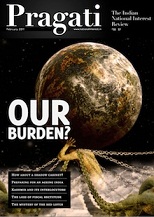Wing It With The Butterflies
Founder and Director of Gateway House Manjeet Kripalani was quoted in a article published by Outlook India.
 Courtesy: outlook
Courtesy: outlook
Founder and Director of Gateway House Manjeet Kripalani was quoted in a article published by Outlook India.
 Courtesy: Shipra Tripathi
Courtesy: Shipra Tripathi
Zimbabwe is an exciting country, still in bud but about to bloom, much like the beautiful blue jacaranda trees in Harare’s Liberty Park. Shipra Tripathi, one of India’s leading experts on Africa, was in the country last month in her new position as Vice President - International Business for Kirloskar Brothers.
 Courtesy: outlookindia.com
Courtesy: outlookindia.com
Indian companies have made progress in Africa, but there is much more available in African markets. Outlook India quoted Renu Modi, an Africa studies research fellow at Gateway House.
 Courtesy: Worldpolicy.org
Courtesy: Worldpolicy.org
Rajni Bakshi's article on the Lokpal Movement was published in World Policy Blog. Bakshi calls into question important elements of Anna Hazare's nationwide movement.

India and the United States have grown close very quickly over the last decade. Their commitment towards the war on terror, pursuit of joint energy security, and the prevention of the proliferation of nuclear weaponry are some on a long list of common goals.
 Courtesy: InDepthNews
Courtesy: InDepthNews
A decade later after 9/11, the U.S. is yet to rally itself against Pakistani-sponsored terrorism and India has not better prepared to defend itself. Gateway House’s Neelam Deo and Akshay Mathur cover India’s national security in a piece published in InDepthNews.
Stating that the United States has a strong interest in helping India in preventing terror attacks, US Assistant Secretary of State for South & Central Asia Robert Blake said the country wants to see improved relations between India and Pakistan.
 Courtesy:
Courtesy:
Pakistan is unlikely to collapse anytime soon, but the imbalance of power between its civilian and military branches needs to be addressed if it is to become an effective modern state. Washington must stop coddling Pakistan’s military and instead work patiently to support the country’s civilian authorities.
 Courtesy: Freestylee/Flickr
Courtesy: Freestylee/Flickr
As soon as something happens in any country, a clamour begins in all the other capitals. Governments are importuned to do or say something. Does saying and doing nothing alter the dynamic of a movement, slow it down or derail it? Are the demands articulated feasible for a government to accept and implement?
 Courtesy:
Courtesy:
In almost every global forum, India has engaged with smaller nations to affect outcomes at the expense of the more broad-based universalist approach it traditionally espoused toward multilateralism. Will these manoeuvres yield stature in the absence of meaningful commitments to the resolution of problems?